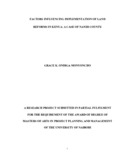| dc.description.abstract | Land is critical to the economic, social and cultural development of a country. Land
reforms involve the changing of laws, regulations or customs regarding land ownership. The study assessed the factors that influence the role of staff in the implementation of land reforms in Nandi County. The study sought: to examine the influence of operational
structures on the implementation of land reforms, to examine how budgetary allocation by government affects implementation of land reforms, to investigate the influence of technical and human capacity on implementation of land reforms and to investigate how work practices influence implementation of land reforms. The study adopted descriptive research survey design. The study was guided by Weber’s theory of bureaucracy and capitalistic theory. The target population of this study comprised of 140 respondents, staff in the ministry
of lands and targeted clients, Nandi County. A sample size of 139 respondents was used. The research used Krejcie and Morgan sampling to select the respondents. The data collection instruments consisted of questionnaires and interview schedules. Piloting was done to establish the reliability of the research instruments in Uasin Gishu County. In this study; percentages and frequencies were used to analyze data. It was found out that majority of the respondents (92) % were of the opinion that management provision of resources is key to
enhancing implementation of land reforms; 86 % were of the opinion that budgetary
allocation by government is inadequate, 90 % were of the opinion that most of the work in the ministry is done manually hence making the implementation of land reforms slow and 74 % were of the opinion that allocation of land is influenced by politicians and rich people. The government should allocate considerable amount of money to the Ministry of Lands for use in implementation of land reforms. Land is, in most forms of society, the most important of natural resources required for creation of wealth. As a direct result therefore, control of the land brings with it economic power, which in turn, is often the basis of social and political
power. The structural framework and principles for the management and administration of land inherited from the colonial times and developed over the three decades since
independence have largely failed to instill confidence on the people. It is thus advisable that the Ministry of Lands seeks for financial support from donors to boost implementation of land reforms especially in the area of modern technology and institutionalization of new land
management processes that are all inclusive. It was crucial to carry out this study as it
provided knowledge to the government of Kenya on how to curb various challenges which
have made the implementation of land reforms a nightmare. | en_US |

